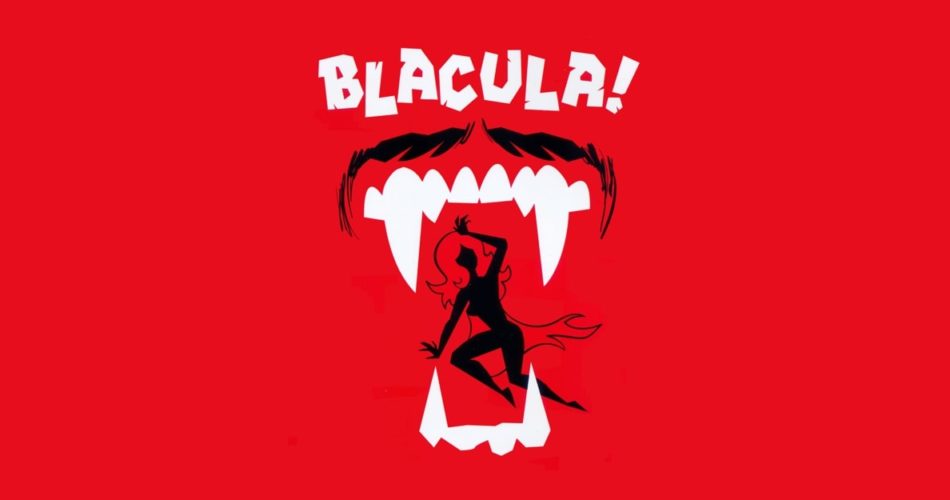The film begins in 1780 with African prince Mamuwalde and his luscious wife visiting Transylvania to lobby for inclusion in an early form of the United Nations so that he can protest his views on slavery. The host, Count Dracula, scoffs at the Dark Continent, deeply insulting Mamuwalde, but worse is to follow as both Dracula’s vampires set upon the prince and princess, and poor Mamuwalde is then condemned to eternal life as the world’s first vampire of African origin; Blacula.
After a particularly stylish animated title sequence, we move on to the present era, where a gay couple is keen on purchasing the remains of Dracula’s Transylvanian castle and having them shipped back to L.A. Among the relics from the castle are several coffins, one occupied by the long-dormant vampire Blacula/Mamuwalde. As the couple excitedly examine their new Transylvanian acquisitions, they overlook one of the coffin lids stirring and the dreadful form of Blacula rising. Moments later, both the gay men are victims to the blood lust of the resurrected Mamuwalde, who returns to his coffin thoroughly satisfied for the first time in ages. Not long after hitting the streets of L.A., Mamuwalde catches a glimpse of the woman who is the spitting image of his wife of centuries ago, Loova. He pursues this woman relentlessly through the streets, ruthlessly destroying anyone who crosses his path.
The horrors multiply as those who fall prey to Mamuwalde turn into bloodthirsty vampires themselves moments after being infected with Blacula’s dreadful bite and search for victims of their own. Soon there is a whole infestation of hungry vampires prowling the area near the warehouse where Blacula’s coffin is housed. Marshall does a great job in the title role, resisting the urge to camp it up and turning in a deadly serious performance as the condemned African vampire.
There are good performances from Thalamus Rasulala, who could hardly go wrong with a name as fabulous as his though Vonetta McGee as Blacula’s reincarnated wife Tina is wooden and appears uneasy. There are some great scenes along the way, such as when Blacula first rises from his coffin to attack the gay couple, rendering them history’s first gay vampires. There are some delightful moments at the local club where punters are entertained by a highly talented R’n’B trio whose amazing vocal range matches their equally cheesy dance routine.
The club is where Blacula rekindles his lost relationship with his long-lost reincarnated wife. The most startling and easily the most effective scene of the film is a Night of the Living Dead-like moment of terror at the warehouse when all Blacula’s victims start to rise for their evening meal, looking suitably ghoulish and zombie-like. The background music, too, is bizarre, with Shaftesque stretches interspersed with some quite effectively chilling “horror” music.
Another memorable scene is at the morgue when one of the corpses slowly twitches to life and then explodes out of the room like a raving banshee to ravage the hook-handed attendant. Besides the obvious, the most memorable aspect of the movie is how the film ends, which is quite a departure from normal vampire procedure and refreshingly original. It also stops short of vilifying Blacula, presenting him as a victim of the vile racist Dracula who cursed him to a life of bloodlust. The film is a wonderful genre off-shoot and illustrates just how popular and all-pervasive the “vampire culture” is within modern horror.
Unfortunately, the plot line is wafer thin and largely involves Blacula chasing after his lovely wife around the cool soul clubs of L.A. But despite its weak script and lack of plot as well as the incredibly cheap made-for-TV 70’s feel, the film still retains a position of reverence among vampire movies of the world and deserves most accolades (and a few stinging criticisms) that have come its way. William Marshall’s excellent portrayal of the cursed creature of the night will always be fondly remembered. (William Marshall passed away the week of 14-6-03 after a long battle against illness. He will be sorely missed and very fondly remembered – Bless him).
